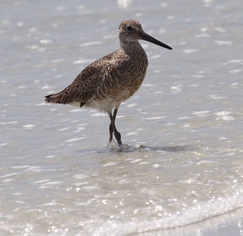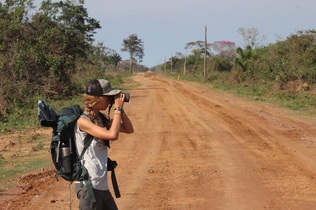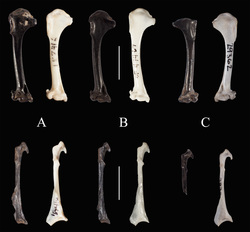Research
Current Projects
Investigating historical distributions and diversity in the Caribbean with aDNA and fossils.
Quaternary fossil sites are abundant across now species-poor Caribbean islands. These islands are home to blue holes and dry caves that have exquisitely preserved the historical diversity of the region. The focus of this work is to understand the evolutionary relationships of extinct species with living taxa to understand the biogeography of the region and extinction dynamics.
Collaborators: David Steadman, Julie Allen, Brian Stucky, Michelle LeFebvre, Rob Guralnick
Funding: 02/01/2021 - 01/31/2025: NSF DEB: Collaborative Research: Origins and drivers of extinction of Caribbean avifauna. Budget: $416,352 of $755,260. Award Number: 2034316
Role: UNR Co-PI.
A comprehensive phylogeny of the Parulidae.
The New World Warblers are composed of approximately 115 species that have a diversity of ecologies and life history strategies. We are using UCEs to build a comprehensive phylogeny of the group that will be used to test the evolution of these various strategies and to investigate diversity patterns across various spatial scales.
Collaborators: Hannah Owens, Julie Allen, Ryan Terrill, Pete Hosner, Ed Braun, Rebecca Kimball, Rob Guralnick
Historical diversity of the Icteridae: Review and revision.
Members of the Icteridae (New World Blackbirds) have relatively high representation in the Quaternary fossil record. Numerous extinct species have been discovered based on these fossils. We are reviewing these extinct species to determine their validity and also investigating what led to extinction events across this family.
Collaborator: David Steadman
Investigating historical distributions and diversity in the Caribbean with aDNA and fossils.
Quaternary fossil sites are abundant across now species-poor Caribbean islands. These islands are home to blue holes and dry caves that have exquisitely preserved the historical diversity of the region. The focus of this work is to understand the evolutionary relationships of extinct species with living taxa to understand the biogeography of the region and extinction dynamics.
Collaborators: David Steadman, Julie Allen, Brian Stucky, Michelle LeFebvre, Rob Guralnick
Funding: 02/01/2021 - 01/31/2025: NSF DEB: Collaborative Research: Origins and drivers of extinction of Caribbean avifauna. Budget: $416,352 of $755,260. Award Number: 2034316
Role: UNR Co-PI.
A comprehensive phylogeny of the Parulidae.
The New World Warblers are composed of approximately 115 species that have a diversity of ecologies and life history strategies. We are using UCEs to build a comprehensive phylogeny of the group that will be used to test the evolution of these various strategies and to investigate diversity patterns across various spatial scales.
Collaborators: Hannah Owens, Julie Allen, Ryan Terrill, Pete Hosner, Ed Braun, Rebecca Kimball, Rob Guralnick
Historical diversity of the Icteridae: Review and revision.
Members of the Icteridae (New World Blackbirds) have relatively high representation in the Quaternary fossil record. Numerous extinct species have been discovered based on these fossils. We are reviewing these extinct species to determine their validity and also investigating what led to extinction events across this family.
Collaborator: David Steadman
Previous research
See Publications and Press.
See Publications and Press.



